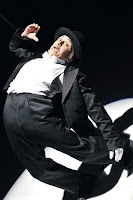
If you thought that the age of physical actors, renaissance men of the human body and all of its faculties, went out with the likes of Charlie Chaplin and Buster Keaton, think again. If you can’t remember the last time that a simple and isolated facial expression simultaneously made you feel pure delight and utter despair, take a trip to the Young Vic where Kafka’s Monkey, Colin Teevan’s adaptation of Franz Kafka’s “A Report to an Academy”, is now in production.
As the ape central in Kafka’s text, Kathryn Hunter ambles onstage carrying a tattered suitcase and dressed in an oversized gentleman’s suit that suggests more caricature than esteem. Her pants hang off of her innocently and her hair peeks out from under her top hat in a humble mess as Hunter abandons her luggage, rummages through some papers and steps to the podium inhabiting the otherwise bare black box space, a larger than life projection of an ape looming beyond her tiny physique. It is in this moment that Hunter’s ape addresses her audience, the presumed “academy”, for the first time and prepares to relate the story of her character’s “former life as an ape” and assimilation into the world of man.
It is not so much the content borrowed from Kafka’s story that makes this a performance worth seeing, although its counterweighted moments of hope and despair, comedy and tragedy, cannot help but penetrate and unsettle even the most stoic of theatergoers. It is Hunter’s sheer performative bravado that, from the moment she steps onstage, never fails to mesmerize. Having been the first woman to play King Lear on the professional stage in the UK, the Olivier Award winning actress is not unfamiliar with taking on a role that does not mimic her own corporeal make-up. In this piece, however, Hunter is not simply playing a man, but a man who was once a monkey: a challenge to any performer, male or female. Her range shines beyond description as she adopts the body language of our hairy predecessor and contorts effortlessly in ways that would be a feat for an actor half her age.
As the ape central in Kafka’s text, Kathryn Hunter ambles onstage carrying a tattered suitcase and dressed in an oversized gentleman’s suit that suggests more caricature than esteem. Her pants hang off of her innocently and her hair peeks out from under her top hat in a humble mess as Hunter abandons her luggage, rummages through some papers and steps to the podium inhabiting the otherwise bare black box space, a larger than life projection of an ape looming beyond her tiny physique. It is in this moment that Hunter’s ape addresses her audience, the presumed “academy”, for the first time and prepares to relate the story of her character’s “former life as an ape” and assimilation into the world of man.
It is not so much the content borrowed from Kafka’s story that makes this a performance worth seeing, although its counterweighted moments of hope and despair, comedy and tragedy, cannot help but penetrate and unsettle even the most stoic of theatergoers. It is Hunter’s sheer performative bravado that, from the moment she steps onstage, never fails to mesmerize. Having been the first woman to play King Lear on the professional stage in the UK, the Olivier Award winning actress is not unfamiliar with taking on a role that does not mimic her own corporeal make-up. In this piece, however, Hunter is not simply playing a man, but a man who was once a monkey: a challenge to any performer, male or female. Her range shines beyond description as she adopts the body language of our hairy predecessor and contorts effortlessly in ways that would be a feat for an actor half her age.
As members of the unnamed Academy, spectators are just as integral to the piece as Hunter herself. Carefully observing and feeding off of the energy of the audience, she never misses a beat in moments of beautiful improvisation and interaction with her guests: she offers a banana to one man, enjoys another woman’s head lice as a delicious refreshment and begs for the return of a bottle of rum that she has left with another man. Do not enter this theatre if you are not willing to give a little back to this performance that gives so much to you.




